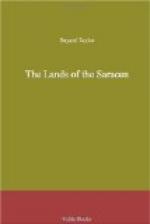Another pleasant feature of the city is its coffee shops, which abound in the bazaars and on the outskirts of the gardens, beside the running streams. Those in the bazaars are spacious rooms with vaulted ceilings, divans running around the four walls, and fountains in the centre. During the afternoon they are nearly always filled with Turks, Armenians and Persians, smoking the narghileh, or water-pipe, which is the universal custom in Damascus. The Persian tobacco, brought here by the caravans from Baghdad, is renowned for this kind of smoking. The most popular coffee-shop is near the citadel, on the banks and over the surface of the Pharpar. It is a rough wooden building, with a roof of straw mats, but the sight and sound of the rushing waters, as they shoot away with arrowy swiftness under your feet, the shade of the trees that line the banks, and the cool breeze that always visits the spot, beguile you into a second pipe ere you are aware. "El ma, wa el khodra, wa el widj el hassan—water, verdure and a beautiful face,” says an old Arab proverb, “are three things which delight the heart,” and the Syrians avow that all three are to be found in Damascus. Not only on the three Sundays of each week, but every day, in the gardens about the city, you may see whole families (and if Jews or Christians, many groups of families) spending the day in the shade, beside the beautiful waters. There are several gardens fitted up purposely for these picnics, with kiosks, fountains and pleasant seats under the trees. You bring your pipes, your provisions and the like with you, but servants are in attendance to furnish fire and water and coffee, for which, on leaving, you give them a small gratuity. Of all the Damascenes I have yet seen, there is not one but declares his city to be the Garden of the World, the Pearl of the Orient, and thanks God and the Prophet for having permitted him to be born and to live in it. But, except the bazaars, the khans and the baths, of which there are several most luxurious establishments, the city itself is neither so rich nor so purely Saracenic in its architecture as Cairo. The streets are narrow and dirty, and the houses, which are never more than two low stories in height, are built of sun-dried bricks, coated with plaster. I miss the solid piles of stone, the elegant doorways, and, above all, the exquisite hanging balconies of carved wood, which meet one in the old streets of Cairo. Damascus is the representative of all that is gay, brilliant, and picturesque, in Oriental life; but for stately magnificence, Cairo, and, I suspect, Baghdad, is its superior.




